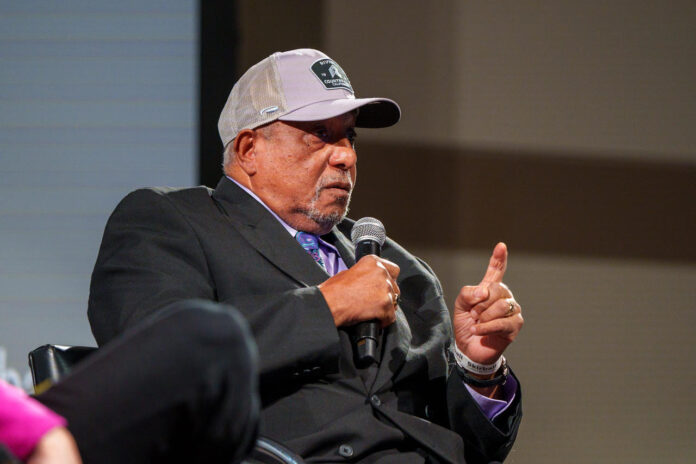
By Solomon O. Smith, California Black Media
Scholar, minister and activist the Rev. Dr. Bernard LaFayette Jr. was the guest speaker at L.A.’s Skirball Cultural Center’s “Perspectives on Black-Jewish Relations in The Fight for Civil Rights” discussion held Dec. 6, on the 68th anniversary of the Montgomery Bus Boycott. He talked about historic collaboration between African Americans and Jews, and he participated in a conversation that focused on the ongoing struggle for civil liberties and the civil rights era of the 1960s.
The evening began at 6 p.m. with an after-hours viewing of “This Light of Ours: Activist Photographers of the Civil Rights Movement,” a photo exhibition that showcased the work of nine photojournalists who were embedded in the civil rights movement, providing an intimate look at the organizations which created leaders like Lafayette.
Los Angeles’ District 5 city councilmember Katie Yaroslavsky hosted the evening’s conversation with LaFayette.
Lafayette described seeing Jewish men and women side by side with Black protesters, enduring the same violence.
“We found a strong bond that existed, and that developed,” LaFayette described the relationship between Black and Jewish leaders, intellectuals and activists during the civil rights movement.
“If it wasn’t for the Jewish people, we’d have a different attitude towards White folks. Because we could relate to the Jewish people, therefore all White people weren’t the same,” he added.
The conversation between LaFayette and Yaroslavsky presented an alternate picture to the widespread portrayal of the history between African Americans and Jewish Americans as one that is ridden by conflict with tensions with Black Muslims and other religious groups, antisemitic scholarship, accusations of exploitation in the entertainment industry, and numerous other examples.
Lafayette was a founding member of the Student Nonviolent Coordinating Committee (SNCC), a member of the Southern Christian Leadership Conference (SCLC), a Freedom Rider and a scholar on nonviolent resistance.
Prompted by Yaroslavsky questions, Lafayette spoke about his upbringing, discussing how the guidance of strong Black female figures led him to a life dedicated to Christianity and activism, starting with his grandmother. Lafeyette credited her with his ordination as a minister.
LaFayette says he originally wanted to become a journalist, but his grandmother had other plans.
“My grandmother insisted that I was not going to be anything but a preacher,” Lafayette said. “She said ‘you have the mark of a preacher.’” The college she found for him was the American Baptist Theological Seminary in Nashville, where he met his roommate, John Robert Lewis, the former Georgia Congressman and civil rights legend who passed away in 2020.
Lewis was already active in the movement and was instrumental in LaFayette meeting one of his heroes and philosophical mentors.
“He was telling me about going to these workshops. I said ‘I ain’t got time for no workshops,” Lafayette said. “He was a very persuasive young man, so I decided to go just to shut him up.”
At that workshop, he would hear one of the leading proponents of the philosophy of nonviolence, James Morris Lawson, Jr.
Yaroslavsky asked Lafayette about the connection between Jews and the Black community, mentioning activists like Rabbi Joachim Prinz, theologian Rabbi Abraham Joshua Heschel and the many Jewish men and women who participated as Freedom Riders.
Learning more about the strategic and impactful collaboration of Black and Jewish activists during the civil rights movement drew many in the Skirball audience to the talk.
Also recognized during the evening was the 2023 winner of the Howard I. Friedman Memorial Graduate Essay Prize, Erin Faigin, a Ph.D. candidate at the University of Wisconsin, Madison. The prize came with an award of $5,000.
After the discussion, a reception was held for Lafayette’s book, “In Peace and Freedom, My Journey in Selma,” which provides an insider perspective on the Civil Rights Movement of the 1960s and Lafayette’s time in Selma, Alabama with Martin Luther King Jr.
Lafayette was with King only hours before he was assassinated.
Lafayette left the audience with what he calls a key to being a nonviolent activist and the way he lives his life.
“The main thing is not how much you can gain for yourself, but how much can you give to others, because you’re not going to be here that long. What we should do is figure out how much we can give,” he said.
This resource is supported in whole or in part by funding provided by the State of California, administered by the California State Library in partnership with the California Department of Social Services and the California Commission on Asian and Pacific Islander American Affairs as part of the Stop the Hate program. To report a hate incident or hate crime and get support, go to CA vs Hate.


